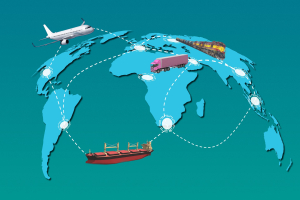
Washington: The Governments of the United States of America and the 17 partner economies including India, termed the shocks to global supply chains from pandemics, wars and conflicts, extreme climate impacts, and natural disasters as a global challenge, and stressed an urgent need to further strengthen supply chains, to work to reduce and end near-term disruptions, and to build long-term resilience.
The US Secretary of State Antony J. Blinken and Secretary of Commerce Gina M. Raimondo co-hosted the Chain Ministerial Forum July 19-20, 2022, to further build cooperation with stakeholders and key partner nations on supply chains. The virtual event convened stakeholders from labour, industry, civil society – including historically underrepresented voices – and subnational officials to address both short-term bottlenecks and longer-term supply chain challenges.
On the occasion of the Supply Chain Ministerial Forum today, these 17 countries, following engagement at the 2022 Supply Chain Ministerial Forum, stated they intend to work together on crisis response in an effort to alleviate near-term transportation, logistics, and supply chain disruptions and bottlenecks as well as the long-term resilience challenges that make supply chains vulnerable and cause spillover effects for consumers, large and small businesses, workers, and families.
“To ensure this effort is effective and reaches those most in need, we intend to engage on this work with businesses, workers, academia, labor and civil society, including women, representatives from local and other communities, consistent with Participants’ domestic laws and international obligations, and different levels of government,” they said.
The countries who signed the joint statement were Australia, Brazil, Canada, the Democratic Republic of the Congo, the European Union, France, Germany, India, Indonesia, Italy, Japan, Mexico, the Netherlands, the Republic of Korea, Singapore, Spain, the United Kingdom, and the United States.
Building collective, long-term resilient supply chains based on international partnerships is critical to the success of this effort. To achieve this, these countries aim to follow these global supply chain principles:
“Transparency: We intend to promote transparency in consultation with the private sector, civil society, different levels of government, and other relevant stakeholders, consistent with Participants’ domestic laws and international obligations, in order to strengthen the resilience of supply chains. Civil society consultations, consistent with Participants’ domestic laws and international obligations, are an important part of transparency. We intend to advance information sharing, and to the extent possible common approaches and early warning systems, about potential, emerging, and systematic supply challenges. We intend to undertake this cooperation consistent with Participants’ domestic laws and international obligations and with utmost care to protect non-public information, including information necessary for the protection of essential security interests,” they said.
“Diversification: We aim to promote diversification and increase global capacities for multiple, reliable, and sustainable sources of materials and inputs, intermediate goods, and finished goods in priority sectors, along with logistics infrastructure capacities, increasing resilience of supply chains to make our economies less vulnerable to disruptions and shocks. We intend to explore opportunities to promote public and private investment into supply chains in priority sectors and to encourage partnerships and co-investment for access to and development of environmentally and socially responsibly sourced materials and inputs.
“We aim to promote the involvement of small and medium sized businesses in priority supply chains. We aim to promote the adoption of digital technologies by micro-, small, and medium sized companies. To advance the principles of equity and inclusion, we aim and strive to ensure investments are made into a broad range of communities, consistent with Participants’ domestic laws and international obligations, throughout our economies.
“Predictability is important to resilient supply chains, and we will aim to work together to promote predictability, openness, fairness, and nondiscrimination in our economic relations as they impact our supply chains. We will aim to reinforce and foster our longstanding, rules-based economic partnerships and supply chain relationships.
“Security: To promote supply chain security, we intend to deepen our consultations to identify and address risks arising from supply dependencies and potential vulnerabilities in critical infrastructure. We intend to work together to address our mutual vulnerabilities and work to eliminate corruption in support of supply chain security. We encourage Participants to undertake this cooperation in partnership with industry, labor and civil society, and other relevant stakeholders, pursuant to domestic laws, to better understand and manage security risks to supply chains.
“Sustainability: We intend to encourage global sustainability and responsible business conduct across supply chains, as well as objectives set out in relevant multilateral environmental agreements to which we are parties, including the United Nations Framework Convention on Climate Change (UNFCCC) and the Paris Agreement. We encourage the adoption of responsible business practices and recognize the importance of implementing our respective obligations under international labor conventions ratified by respective countries along the entire value chain to ensure that opening up new sourcing or supply chain options does not shortcut existing commitments to uphold human rights. This includes our intent to cooperate to eradicate the use of forced labor in global supply chains. We aim to foster the increased use of recycled materials and product components. We also aim to foster and support the fair and sustainable manufacturing and trade of products, consistent with Participants’ domestic laws and international obligations, including through circular economy, the bioeconomy, and other approaches, that advance the fight against climate change, biodiversity loss, pollution, and which advance the UN Sustainable Development Goals.”
The participating countries welcomed all economies and invited all industries, businesses, women, workers, officials from different levels of government, labour and civil society, and other stakeholders to join them in pursuit of resilient supply chains, guided by these principles. We acknowledge the key to resolving the next global supply chain crisis is to prevent it from happening in the first place.
This summit was part of the US Administration’s whole-of-
– global bihari bureau




